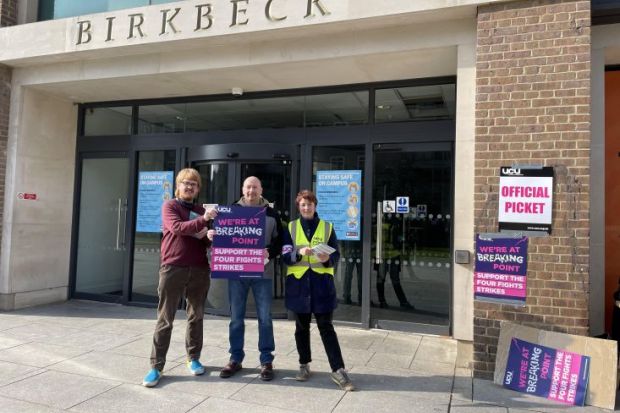UK universities should rule out hiring agency workers to cover striking staff despite the Westminster government’s plan to relax the law, union leaders have said.
Ministers have tabled legislation that seeks to repeal the five-decade-old law that prevents employers from engaging temporary workers to break a strike. If approved by Parliament, the changes could allow higher education institutions to bring in outside staff to cover areas such as marking and teaching to soften the impact of future industrial action.
But the University and College Union, which has called 13 strike days over the past academic year and still has members participating in a marking boycott in long-running disputes over pay and pensions, said this would not work in higher education.
General secretary Jo Grady highlighted the criticism of Queen Mary University of London, which has brought in internal and external staff to undertake marking. Academics and students have complained about the “basic feedback” and have claimed that marks have been “somewhat inflated”.
The university, which reportedly considered and then ruled out outsourcing marking to a consultancy firm, insisted that the “small number” of students affected were having their work “assessed rigorously”. A spokesman said Queen Mary “[did] not recognise the misinformation being circulated about the supposed quality of assessment”.
But Dr Grady called the situation at Queen Mary a “complete farce”, adding that marking seemed to have been done by people “with a complete lack of subject expertise”.
“Academics often spend years becoming experts in their respective fields, and the idea that an agency worker could do their work is frankly laughable,” she said.
Some experts questioned whether universities would consider using agency workers for this reason.
Parents and students would “object to this type of provision given the [tuition] fees”, said Roger Seifert, emeritus professor of industrial relations at Wolverhampton University.
Kim Hoque, professor of human resource management at the University of Warwick, said most vice-chancellors would be wary of further poisoning relations with staff by bringing in external replacements – and questioned who would be willing to help break a strike.
“The academic world is a very small world. You come in as effectively scab labour and take work off people who are engaged in strike action. What is going to happen when you bump into those people at conferences? What’s going to happen from the point of view of working collaboratively? I think an awful lot of people just would not do it.”
Professor Hoque added: “Universities, if they are sensible, will look at this and think, no way is this a wise thing to do. The repercussions could be enormous.”
But James Eastwood, chair of the UCU branch at Queen Mary, said events there indicated that some universities might consider bringing in agency workers – triggering a “race to the bottom in higher education standards”.
The government move has been prompted by a three-day strike on British railways, which has also seen the UCU’s leadership coming under pressure from some members to join a wider “fightback” against the cost-of-living crisis.
Earlier this month, the union’s congress voted to hold fresh ballots on extending industrial action into 2022-23, but a date for voting is yet to be set.
The UCU Left group reported that Dr Grady would like to pause the disputes to give the union a chance to regroup, but it argued that this was “no time” to “pause and reflect”.
“You don’t build a union by putting off the fight until sometime in the future. Our experience is simple: when we fight, we grow,” UCU Left said.




